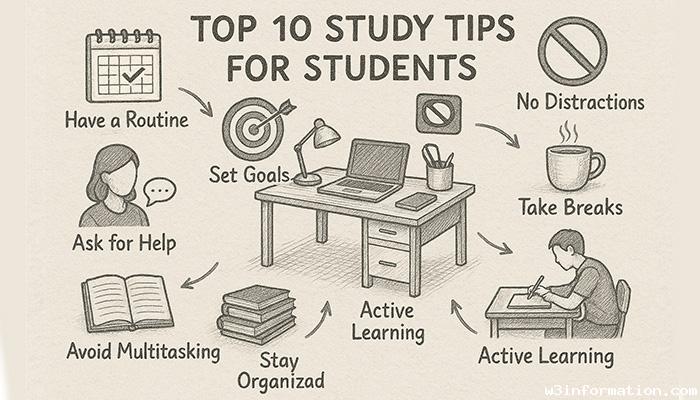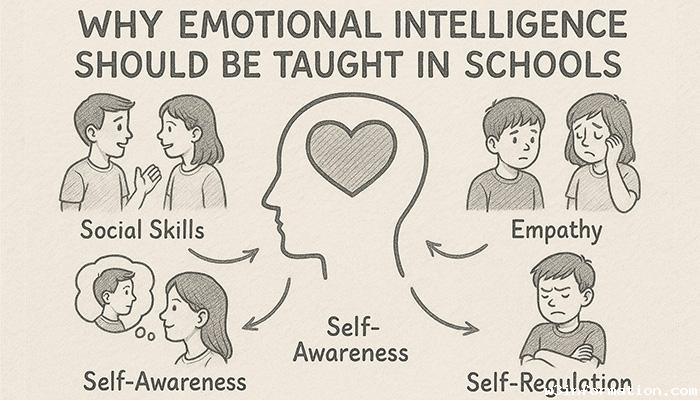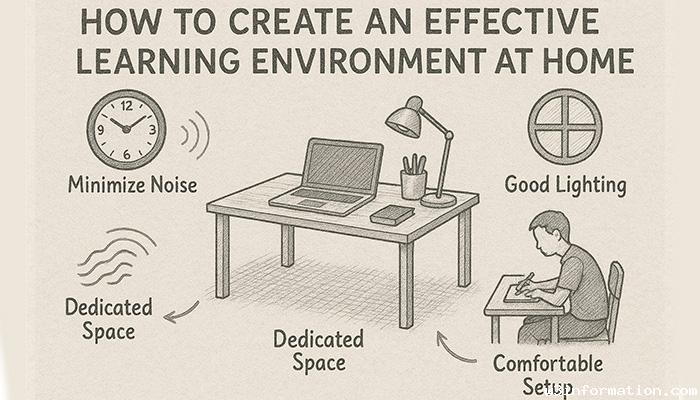Top 10 Study Tips for Students
Academic achievement results not from increased study hours but from improved study methods. Students can enhance their concentration and improve information retention by applying effective study strategies which will help them utilize their study time more efficiently. These top 10 study tips will help students from school through college and those preparing for competitive exams maintain organization while staying focused and confident during their educational journey.
Create a Dedicated Study Space
Select a silent and cozy area free from distractions where your studying sessions can take place regularly. When your study space is tidy and well-organized it boosts concentration levels and establishes an environment good for productive work sessions.

Make a Study Schedule
Planning is essential. Divide your syllabus into smaller parts and create specific time blocks for each subject study session. Maintaining a daily or weekly study routine establishes a consistent pattern that keeps you aligned with upcoming deadlines and exam requirements.
Use Active Learning Techniques
Do not just read or highlight texts; instead use methods like summarizing content or teaching others and practice with flashcards and quizzes.Active learning reinforces memory and deepens understanding.
Set Clear Goals:
Determine specific and attainable objectives before every study session such as finishing a chapter or solving a particular set of problems. When you establish clear targets your attention remains strong and you achieve a feeling of success.
Take Regular Breaks
The brain has a limited capacity to maintain focus during study sessions. Implement the Pomodoro Technique which involves studying for 25 minutes and then resting for 5 minutes. After four cycles, take a longer break. Regular breaks help you avoid burnout while giving your mind time to recharge.
Stay Away from Distractions
Set your phone to silent mode or download apps that restrict access to social media while studying.Tell everyone nearby that you are studying so they don’t disturb you. Focused time beats long, distracted hours.
Use Visual Aids
Color-coded notes along with diagrams and mind maps help people remember information better while making review sessions more entertaining. Visual learners gain more from understanding how ideas connect when they see them represented visually.
Practice Past Papers and Sample Questions
Taking mock tests and reviewing previous exam papers enables students to recognize exam patterns and pinpoint their weak areas. This approach results in increased confidence while also enhancing your ability to manage time effectively.
Stay Healthy
Students who maintain good physical and mental health achieve better academic performance. Maintain a healthy body through sufficient sleep and nutritious meals while drinking lots of water and exercising consistently. A healthy body fuels a sharp mind.
Stay Positive and Reward Yourself
Maintain a growth mindset. Rather than thinking "I'm not capable of this," affirm to yourself "I'm gaining knowledge and improving." Use small rewards after meeting your study targets to maintain motivation and boost your drive.
Conclusion
Any person can learn how to study effectively by establishing proper habits and adopting the correct mindset. Remember: Regular study habits outperform last-minute cramming while intelligent techniques provide significant advantages.When students follow these tips they develop a balanced academic approach that produces long-term success.
 Why Emotional Intelligence Should Be Taught in Schools
Why Emotional Intelligence Should Be Taught in Schools
 The Future of Higher Education: Trends to Watch
The Future of Higher Education: Trends to Watch
 How to Create an Effective Learning Environment at Home
How to Create an Effective Learning Environment at Home
 How Online Learning is Changing the Education Landscape
How Online Learning is Changing the Education Landscape
 How to create backend CRM using React JS
How to create backend CRM using React JS